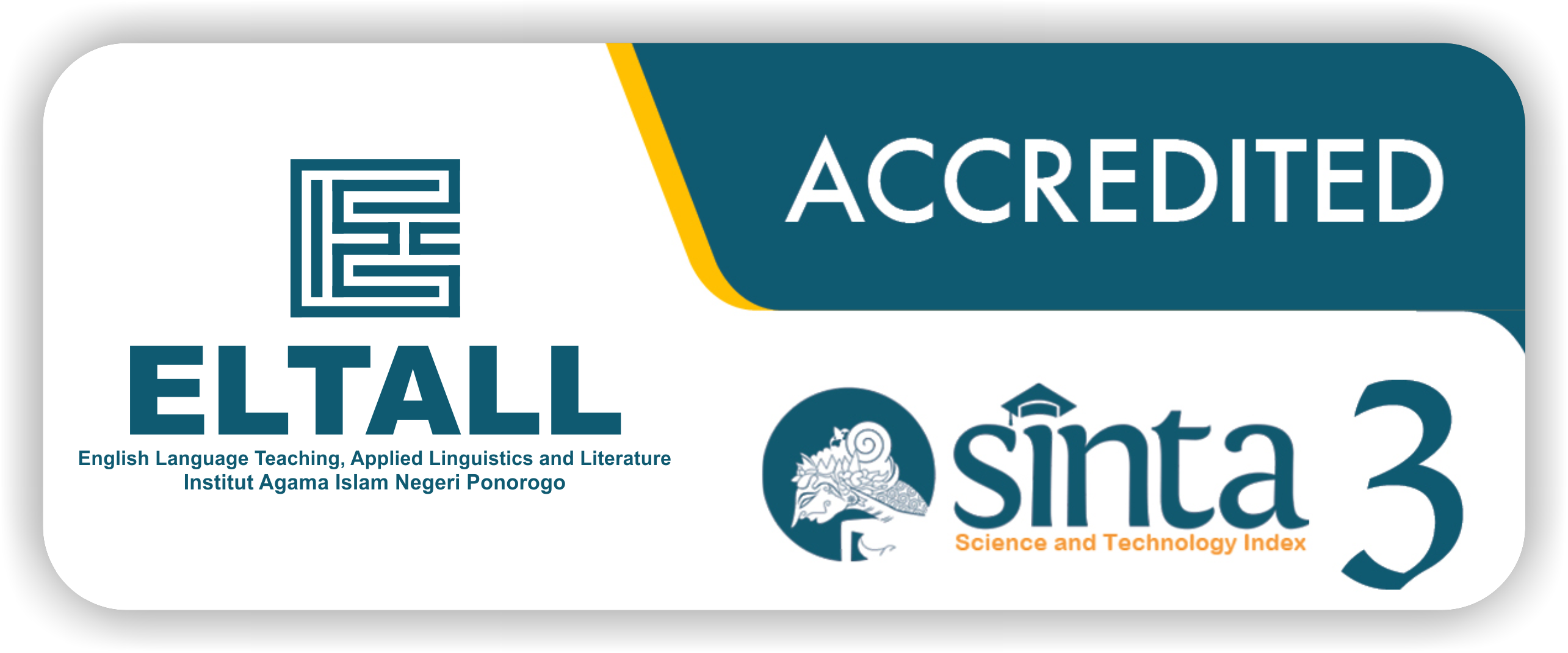Developing an English Course Teaching Plan for a Semester from the Task-Based Language Teaching (TBLT) for the Mathematics Department Students at Zainul Hasan Islamic University of Probolinggo
DOI:
https://doi.org/10.21154/eltall.v5i1.6862Keywords:
Teaching Plan for a Semester, English for Specific Purposes, MathematicsAbstract
The development of a Teaching Plan for a Semester (TPS) is directly related to the analysis of competency standards, teaching methods, and learning evaluation. Based on that, the specific targets to be achieved in this research include two things. The two objectives are (i) to formulate graduates' English learning outcomes based on needs analysis and objective analysis of input English proficiency and (ii) to design learning materials to meet the formulated learning outcomes. In general, the research method used is the development research method of Gall, Borg, Van den Akker, Gravemeijer, McKenney, and Nieven. Meanwhile, the approach used in this study is a combination of the ADDIE approach from Branch and the systems approach from Dick and Carey. The results of the study show that the level of English language needs indicated by stakeholders must be adapted. This adaptation is based on input competencies that do not meet the standards to be put into the ESP stage purely. Therefore, the design of the ESP lesson plan is still carried out by considering matters related to the input of general English competence.
Downloads
References
Basturkmen, H. (2010). Developing Courses in English for Specific Purposes. New York: Palgrave.
Bogaert, N; VanGorp, K; & Bultynck, K. (2006). "Task-based language teaching in science education and vocational training", pp. 106-128, in Kris Van den Branden. Task-Based Language Education: From Theory to Practice. Cambridge: Cambridge University Press.
Branch, RM. (2009). Instructional Design: The ADDIE Approach. New York: Springer.
Butler, YG. (2011). “The implementation of communicative and task-based language teaching in the Asia-Pacific region”. Annual Review of Applied Linguistics, 31, 36-57.
Cheng, A. (2011) ESP classroom”“based research: Basic considerations and future research questions. In D. Belcher, AM Johns, and B. Paltridge (eds.), New Directions in English for Specific Purposes Research.44 ”“ 72. Ann Arbor: University of Michigan Press
Dick, W., Carey, L., & Carey, JO. (2001). The Systematic Design of Instruction. 6th Editions. New Jersey: Pearson.
Ellis, R. (2003). Task-Based LanguageTeaching and Learning. Oxford: Cambridge University Press & Assessment
Government Regulation Number 32 Years 2013 concerning Amendments to Government Regulation Number 19 of 2005 concerning Standards National Education.
Hutchinson, T., & Waters, A. (1987). English for Specific Purposes. Cambridge: CUP
Kenney, S; and Nieven, N. (2006). Educational Design Research. New York: Routledgesuggestions”, ELT Journal,58(4) vans den Branden, K. (2006). 319-326.
Kusmanto, J. (2003). “The acquisition of English Negation no and not: evidence from an Indonesian child in non-native bilingual parents program”. Journal of Kota,5(1).
Kusmanto, J.(2004). “From code-switching to communication strategy: evidence of two systems in early bilinguals”, in Sukamto, E. (ed.). Proceedings of the 2nd Annual Linguistic Conference: International Level. LTBI, Atma Jaya University, Jakarta.
Lai, C., & Li, G. (2011). Technology and task-based language teaching: a critical review. CALICO Journal,28(2), 498-521.
Littlewood, W. (2004). “Task-based approach: some questions and Language Teaching Conference, Sept. 13-16. Lancaster, UK.
Norris, JM. (2009). “Task-based teaching and testing”, pp. 578-594, in MH Long and CJ Doughty. The Handbook of Language Teaching. London: Wiley-Blackwell.
Nunan, D. (2004).Task-Based Language Teaching. Cambridge: CUP. Ortega, L. (2009).Task and Technology in Language Learning: Elective Affinities and (Dis)encounters.Plenary delivered at the 3rd International Task-Based “Introduction: task-based language teaching in a nutshell”, pp. 1-16, in Kris Van den Branden. Task-Based Language Education: From Theory to Practice. Cambridge: Cambridge University Press.
OUP. Gall, MD; Gall, JP; & Borg, WR. (2003). Education Research: An Introduction. 7thEditions. New York: Pearson Education.
Paltridge, B., & Starfield, S. (eds.). (2013). The Handbook of English for Specific Purposes. Boston: Wiley- Blackwell.
Pica, T. (2005). "Classroom learning, teaching, and research: a task-based perspective”. The Modern Language Journal, 8(9), 339-352.
Prabhu, NS. (1987). Second Language Pedagogy. Oxford: OUP Sanchez, A. (2004). “The task-based approach in language teaching”, International Journal of English Studies, 4(1), 39-71
Regulation of the Minister of Education Number 49 2014 concerning National Higher Education Standards.
Thanh, LN and Huan NB (2012). "Task-based language learning and student motivation in vocabulary acquisition".Language Education in Asia,3(1), 106-120.
Thomas, G and Pring, R. (2004). Evidence-Based Practice in Education. New York: Open University Press Van den Akker, J; Gravemeijer, K; Mc
Willis, D., & Willis, J. (2007). Doing Task-based Teaching. Oxford: OUP
Willis, J. (1996). A Framework for Task-based Learning. Edinburgh: Longman.
Downloads
Published
Issue
Section
License
Copyright (c) 2024 ELTALL: English Language Teaching, Applied Linguistic and Literature

This work is licensed under a Creative Commons Attribution-NonCommercial 4.0 International License.
All articles published in ELTALL (English Language Teaching, Applied Linguistics, and Literature Journal) are licensed under the Creative Commons Attribution-NonCommercial 4.0 International License (CC BY-NC 4.0).
Under this license, authors and readers are free to:
- Share. copy and redistribute the material in any medium or format
- Adapt. remix, transform, and build upon the material
Under the following terms:
- Attribution. You must give appropriate credit, provide a link to the license, and indicate if changes were made. You may do so in any reasonable manner but not in any way that suggests the licensor endorses you or your use.
- Non-Commercial. You may not use the material for commercial purposes.
Notices:
- The licensor cannot revoke these freedoms as long as you follow the license terms.
- No additional restrictions. You may not apply legal terms or technological measures that legally restrict others from doing anything the license permits.
For the full legal code of the license, please visit: https://creativecommons.org/licenses/by-nc/4.0/













